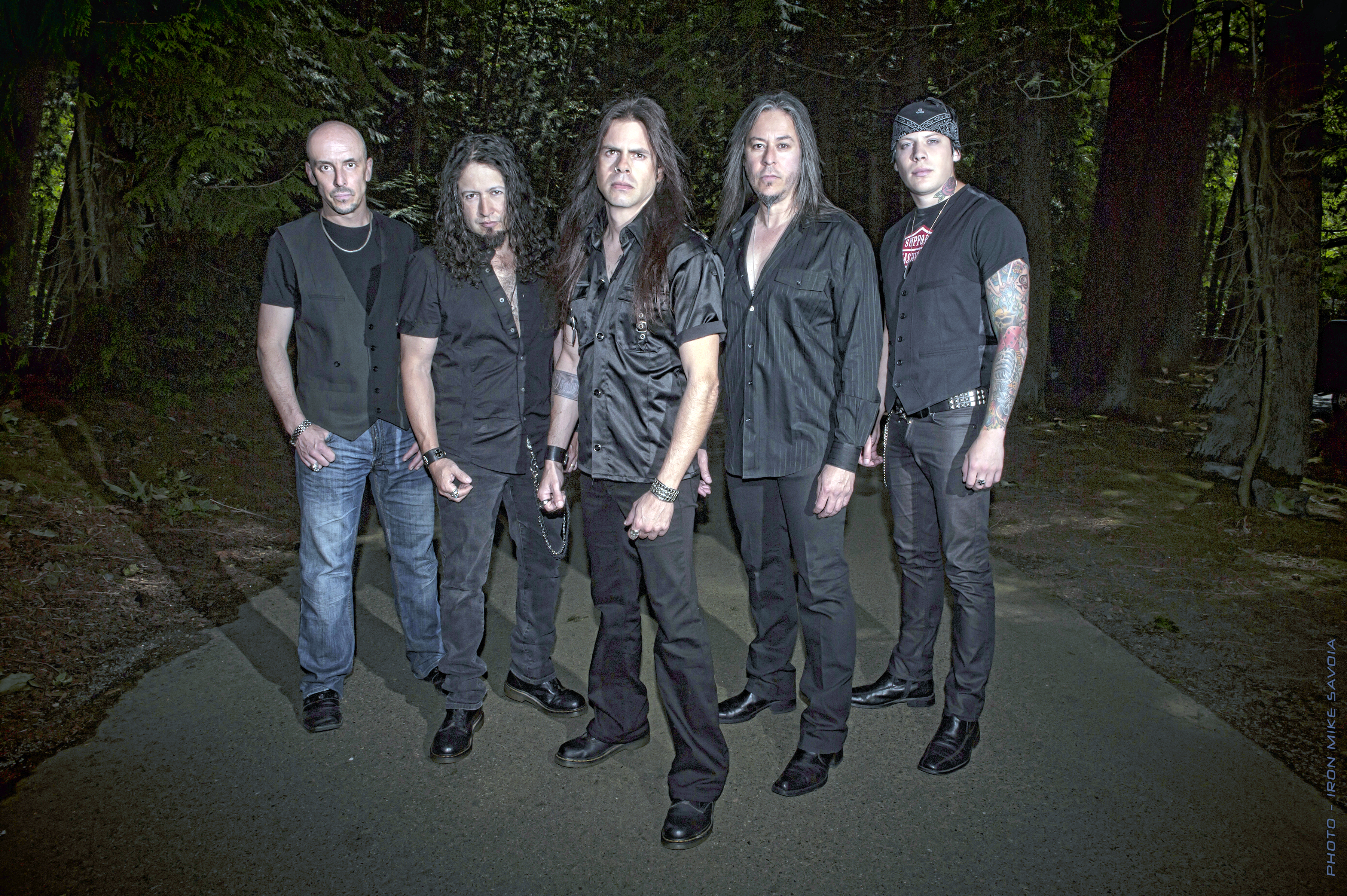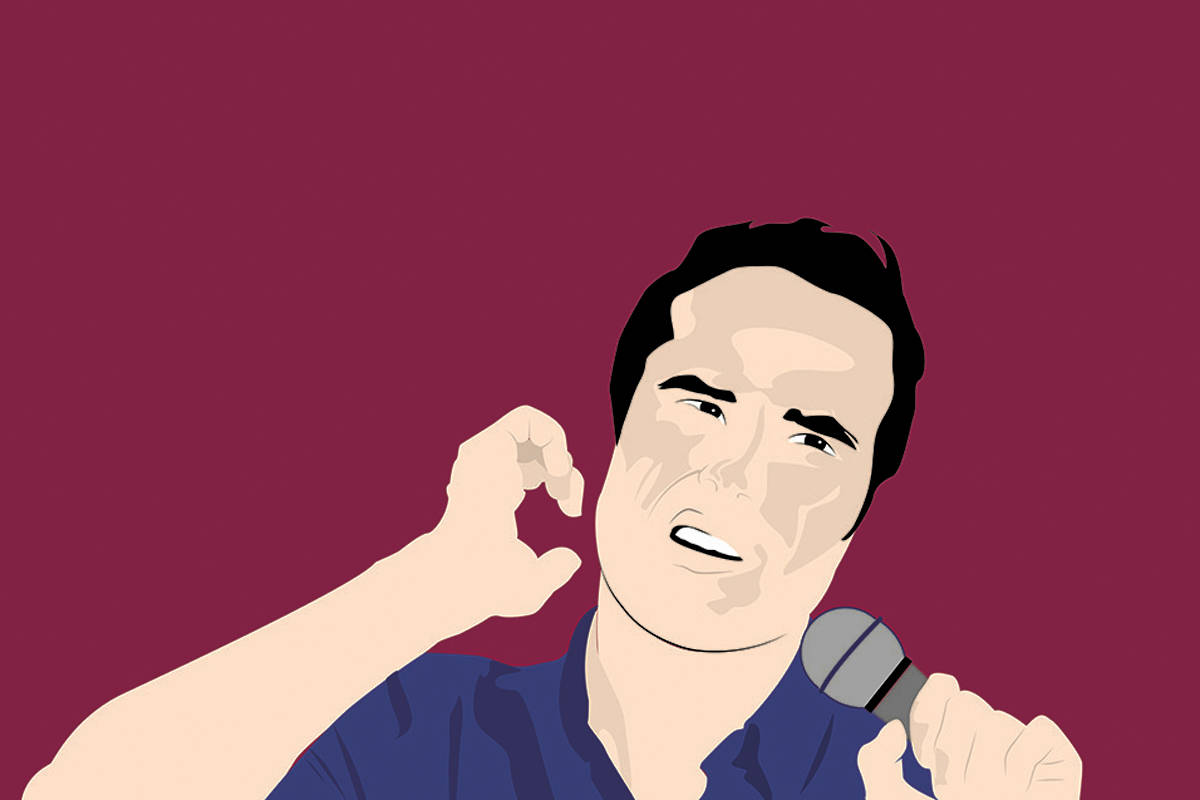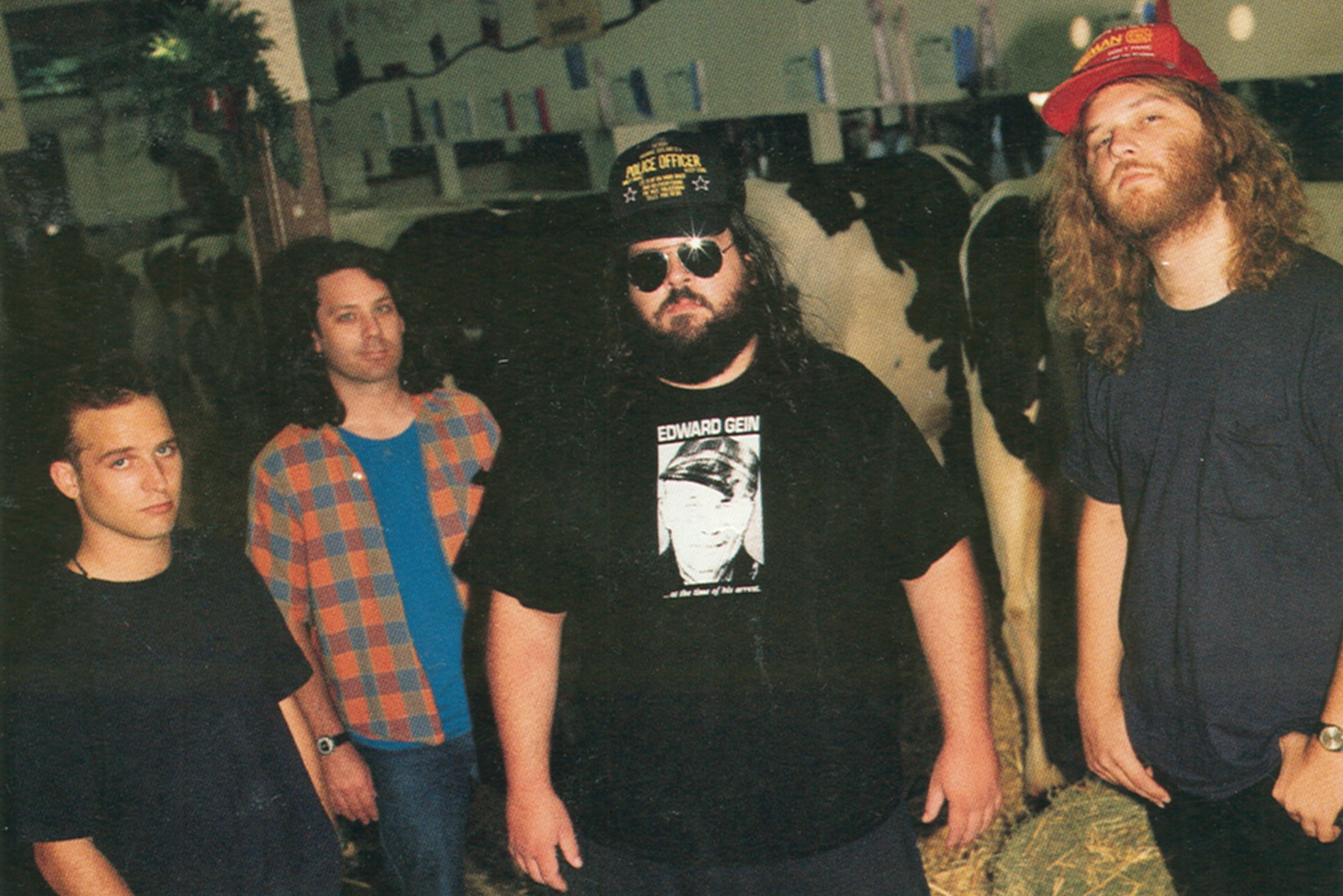On a warm summer night this past June, Jason Ames handed out flyers for an upcoming Queensrÿche gig at the Moore Theatre. He walked the line of middle-aged metalheads at the Crocodile, a line that ran from the venue’s box office on Blanchard Street down and around onto Second Avenue, offering handbills to anyone who wanted one. What made this seemingly ordinary event so unusual is that the band playing that night at the Crocodile was also Queensrÿche. Confused? You aren’t alone.
For the past 12 months, two versions of Queensrÿche have been operating simultaneously. Both have issued new albums under that name, and both ended up playing Seattle in the same week. In November, a Washington state judge will determine which one is the true Queensrÿche and allowed to retain ownership of the name. Until then: dueling Queensrÿches.
“It’s been confusing,” said Queensrÿche drummer and founding member Scott Rockenfeld. “And probably still is for all the fans that don’t know all the details.”
To explain this, it’s necessary to back up a bit. Thirty-one years, to be exact. Queensrÿche’s story began in Bellevue in 1982. Formed by Rockenfeld, guitarists Chris DeGarmo and Michael Wilton, and bassist Eddie Jackson, the group was originally a cover band called The Mob, playing favorites by early metal acts like Judas Priest and Black Sabbath, whose song the group named itself after. When the group needed a singer for a local festival, it recruited Geoff Tate, a talented singer with a big range whose allegiance at the time was to another local hard-rock band. Tate played the gig, but wasn’t interested in singing for a cover band.
When The Mob cobbled together enough money to record an EP of original tunes, the band again sought out Tate. He agreed to sing on the album, but was still apprehensive about joining full-time. It wasn’t until The Mob attracted the attention of Kim and Diana Harris, then-owners of Easy Street Records, that it really began to pick up steam and changed its name to Queensrÿche. Managed by the Harrises, the band released the EP—which sold 60,000 copies independently—and, after a year of looking for a record deal, finally landed one with EMI. With a contract pending, Tate finally left his band to join Queensrÿche full-time. The metal five-piece was off and running.
For a decade and a half, things were good. Better than good, in fact. The money rolled in and fame followed, as did several hit records, including 1988’s Operation: Mindcrime and 1990’s Empire, which earned the band a Grammy nomination and yielded its biggest hit, the power ballad “Silent Lucidity,” which cracked the Billboard Top 10 and won the Viewer’s Choice Award at the 1991 MTV Video Music Awards. The group went on to sell 20 million records on the back of its workmanlike, thinking-man’s metal. Queensrÿche wasn’t sex-obsessed like Motley Crue or populated by vapid pretty boys like Poison, and it was musically more muscular than Bon Jovi, all of which ultimately separated the band from the rest of the hair-metal pack. The group earned a reputation for its music rather than its partying, and thus became one of the first progressive-metal bands to achieve commercial success.
As the years rolled on, metal fell out of favor with mainstream audiences, but the band pushed forward. DeGarmo left in 1997, and the band’s interpersonal relationships began to fracture—slowly at first, but steadily, eventually splitting the group into two factions: Geoff Tate and everybody else.
Queensrÿche operated for years with the two sides frequently disagreeing on how best to run the business or in which direction to take the music. These issues were further complicated in 2005 when Tate’s wife became the band’s manager—a contentious decision, though in fairness other band wives were also involved in the organization at various times. Tate and his wife exerted the most control, though, with Wilton, Jackson, and Rockenfeld reluctantly following suit.
“A lot of it started 10 years ago,” says Rockenfeld. “Our musical direction together was starting to separate. Michael, Eddie, and I have always been very connected when it comes to what we feel we should be doing together, and then Geoff was of a different headspace.”
These musical differences can be heard on Queensrÿche’s post-2000 output, which strays from the band’s roots—largely because few of the core members were involved aside from Tate, who had begun to write with musicians outside the group. Tate had ideas about the kind of music the band should be making, but so did Jackson, Rockenfeld, and Wilton, who felt marginalized by Tate and his wife, Susan, but who chose not to rock the boat in hopes that the two factions might someday realign. The band’s 2010 album Dedicated to Chaos sold just 20,000 copies.
Despite those relatively meager sales and all the acrimony, the group remained a lucrative business. Court documents reveal that Queensrÿche generated an average of $2.9 million per year from 2007 to 2011—a large sum for a band so many years past its commercial heyday, and one that netted each core member a comfortable six-figure annual income. These weren’t the golden handcuffs familiar to high-powered corporate executives, but the money was still enticing enough to keep the members together despite their differences.
A 2011 incident challenged that resolve. Tate had brokered a deal with a film producer who wanted to turn the concept album Operation: Mindcrime into an animated feature. Tate claims the record’s storyline, about a junkie brainwashed into joining a revolutionary group to assassinate political leaders, was his idea, and thus he didn’t require the permission of the rest of the band. The other band disagreed, and the deal was quashed.
In April 2012, before a gig in Brazil, the inner conflict reached a boiling point. After learning the band had decided, among other things, to relieve his wife of her management duties, Tate lost it. As the band took the stage, the singer allegedly flew into a rage, flipping over Rockenfeld’s drum kit, throwing punches at Wilton, and shouting obscenities at both. Security stepped in. The group played the show, but Tate’s relationship with the rest of the band was forever tarnished. He was fired shortly thereafter, prompting the 54-year-old frontman to file an injunction against his former bandmates in hopes of preventing them from operating as Queensrÿche. As his complaint outlines, Tate considered himself “the heart, brains, and soul of the band.” A judge denied Tate’s motion, however, allowing both Tate and his former bandmates to operate as Queensrÿche until the matter comes to trial in November.
In the months since Tate’s firing, Jackson, Rockenfeld, and Wilton recruited a new singer, Todd LaTorre of the band Crimson Glory, and released a new self-titled Queensrÿche record. Tate put together a band of his own and also released a record, Frequency Unknown. Its cover features a clenched fist sporting three rings: One displays a Queensrÿche logo and the other two contain the letters “F” and a “U,” a not-so-subtle message to his former bandmates.
Queensrÿche is hardly the first band to argue over the ownership of its name. As long as there have been bands, there have been band arguments. Axl Rose famously secured away the rights to the Guns N’ Roses moniker from his Appetite for Destruction-era bandmates while they were on tour together. Great White members have been warring in recent months with former singer Jack Russell over his right to use the name. And for many years, two members of L.A. Guns each claimed ownership of that name, with each operating a different version of the group simultaneously—creating confusion in the marketplace not unlike that caused by the concurrent Queensrÿches.
Another band many years past its commercial peak has also been fighting a similar court battle: grunge stalwarts Stone Temple Pilots. When Scott Weiland was fired from STP in February, the singer claimed his bandmates weren’t legally allowed to do so. Naturally, they disagreed and filed a lawsuit against him, claiming Weiland had caused the band to lose millions in revenue thanks to flaky behavior and missed appearances. When the band replaced him with Linkin Park singer Chester Bennington and sent a new single to Los Angeles radio station KROQ, Weiland’s attorney called the station and asked them to “back off” their support of the song since it infringed upon Weiland’s rights.
At the center of nearly all these cases are dueling narratives. In their autobiographies, former Guns N’ Roses members Slash and Duff McKagan both outline the process Axl Rose used to secure the GN’R name, which differ substantially from Rose’s own recollection of how things went down. The same is true with Queensrÿche: Both factions tell different stories, and each feels righteous. With so much at stake—not just financially, but in terms of ego, identity, power, and more—it’s easy to see why.
Rockenfeld says there was animosity between him and Tate for a long time behind the scenes. “Like a divorce, it’s a small struggle, and you carry on hoping it’ll get better and then it doesn’t,” he says. “It continuously, through the years, got harder and harder and more of a struggle, until basically it got to the point where we had to put our foot down and say we have to move on.”
Tate tells a different story. “It wasn’t bumpy at all,” he says of the band’s relationship. “There weren’t any personal problems. It was all information that was created for a court case in order to win something.”
It’s not only in the Superior Court of Washington that this drama will unfold, but in the court of public opinion as well. At a recent Seattle performance by the Jackson/Rockenfeld/Wilton contingent, every concertgoer interviewed for this story was aware of the feud, and each had chosen sides. Matt Marconi, a longtime fan from University Place who estimates he’s seen the band some 50 times, said it was Tate’s actions and attitude post-firing that helped him decide which faction to be loyal to. “[Tate] has a sense of arrogance and disrespect for where Queensrÿche came from,” he said. “He has a way of talking down to people.”
Other fans had a different take. “You don’t have to choose one version of Queensrÿche over another,” Stacey Hubbard wrote on the Facebook page of Tate’s group. “Choose both and support each one, that’s what a real fan of Queensrÿche does!”
No matter which version of the band ends up owning the name, both Queensrÿches are coming to terms with moving on. “The first couple months were really shocking for me and very emotionally draining,” Tate says. “Once I got past that and saw that there wasn’t any reconciliation, I pretty much turned away from it and focused on what I was interested in doing.”
Rockenfeld is similarly pragmatic. “We’re doing the best we can to get ourselves back to having the best time possible,” he says. “Because that energy is what makes us good at what we’re doing. That’s what made us good when we made the first EP and all those other records. We were having fun.”
Fans need not despair. The Queensrÿche story could still have a happy ending. Vince Neil ended up back in Motley Crue a few years after their split. David Lee Roth eventually reunited with Van Halen. Hell, even the Eagles, whose members seemed to hate each other as much as any members of a rock band possibly could, got back together—and they didn’t even need the money.
music@seattleweekly.com








